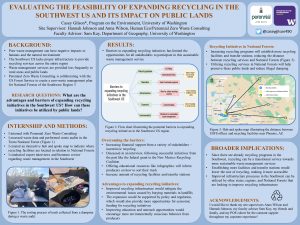EVALUATING THE FEASIBILITY OF EXPANDING RECYCLING IN THE SOUTHWEST US AND ITS IMPACTS ON PUBLIC LANDS
In the United States, waste management services are utilized to manage and dispose of waste created by individuals and communities. Improper waste management can have devastating impacts on the environment and can be detrimental to human health. Many areas across the US experience limited access to waste management services. As an intern at Human Eco Consulting, I organized and analyzed data and information regarding waste management at National Forests in the Southwest US and performed waste audits to understand the current services provided at National Forests. This project provided insight into the broader recycling habits of the Southwest region and indicated the lack of recycling infrastructure in both Arizona and New Mexico. The purpose of this study was to examine the advantages and barriers of expanding recycling initiatives in the Southwest US and also sought to understand how these initiatives can be used by National Forests in the region. I conducted expert interviews to gain insight from professionals with waste management experience in the Southwest and also conducted literature review, utilizing these sources to gain insight into waste management and recycling, both domestically and internationally. Through this research, I concluded that barriers to expanding recycling initiatives in the Southwest US include education, infrastructure, economic, environmental, and policy/regulation. Advantages to expanding recycling initiatives include encouraging environmental preservation and acknowledging issues of how waste is currently managed. Expanded recycling initiatives mean more opportunities for national forests to participate in sustainable waste management and encourage better waste habits from visitors.
